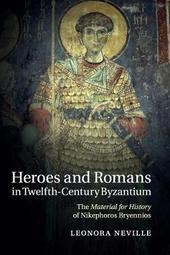
|
Heroes and Romans in Twelfth-Century Byzantium: The Material for History of Nikephoros Bryennios
Paperback / softback
Main Details
| Title |
Heroes and Romans in Twelfth-Century Byzantium: The Material for History of Nikephoros Bryennios
|
| Authors and Contributors |
By (author) Leonora Neville
|
| Physical Properties |
| Format:Paperback / softback | | Pages:258 | | Dimensions(mm): Height 228,Width 152 |
|
| ISBN/Barcode |
9781316628935
|
| Classifications | Dewey:949.503 |
|---|
| Audience | | Professional & Vocational | |
|---|
| Illustrations |
2 Tables, black and white; 2 Line drawings, black and white
|
|
Publishing Details |
| Publisher |
Cambridge University Press
|
| Imprint |
Cambridge University Press
|
| Publication Date |
29 September 2016 |
| Publication Country |
United Kingdom
|
Description
Nikephoros Bryennios' history of the Byzantine Empire in the 1070s is a story of civil war and aristocratic rebellion in the midst of the Turkish conquest of Anatolia. Commonly remembered as the passive and unambitious husband of Princess Anna Komnene (author of the Alexiad), Bryennios is revealed as a skilled author whose history draws on cultural memories of classical Roman honor and proper masculinity to evaluate the politicians of the 1070s and implicitly to exhort his twelfth-century contemporaries to honorable behavior. Bryennios' story valorizes the memory of his grandfather and other honorable, but failed, generals of the eleventh century while subtly portraying the victorious Alexios Komnenos as un-Roman. This reading of the Material for History sheds new light on twelfth-century Byzantine culture and politics, especially the contested accession of John Komnenos, the relationship between Bryennios' history and the Alexiad and the function of cultural memories of Roman honor in Byzantium.
Author Biography
Leonora Neville holds the John W. and Jeanne M. Rowe Professorship in Byzantine History at the University of Wisconsin, Madison and is the author of Authority in Byzantine Provincial Society: 950-1100 (2004).
Reviews'... elegantly written and persuasively argued ... it rekindles the conversation about twelfth-century culture, politics, and historiography, aligning it with recent scholarship in the fields of Roman and Byzantine studies.' Dimitris Krallis, English Historical Review '... dazzling and insightful ...' Mike Markowitz, The NYMAS Review
|